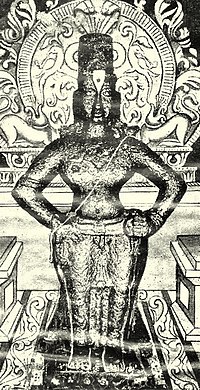Vittala
| Vithoba Vitthala |
|
|---|---|

The central image at Vitthal Temple, Pandharpur
|
|
| Devanagari | विठोबा विठ्ठल |
| Sanskrit transliteration |
Viṭhobā Viṭṭhala |
| Affiliation | Form of Vishnu or Krishna |
| Abode | Pandharpur |
| Mount | Garuda, when associated with Vishnu |
| Consort | Rakhumai |
Vithoba, also known as Vi(t)thal(a) and Panduranga, is a Hindu god predominantly worshipped in the Indian states of Maharashtra, Karnataka, Goa, Telangana and Andhra Pradesh. He is generally considered a manifestation of the god Vishnu or his avatar, Krishna. Vithoba is often depicted as a dark young boy, standing arms akimbo on a brick, sometimes accompanied by his main consort Rakhumai.
Vithoba is the focus of the monotheistic, non-BrahamanicalVarkari faith of Maharashtra and the Haridasa faith of Karnataka. Vitthal Temple, Pandharpur is his main temple. Vithoba legends revolve around his devotee Pundalik, who is credited with bringing the deity to Pandharpur, and around Viṭhoba's role as a saviour to the poet-saints of the Varkari faith. The Varkari poet-saints are known for their unique genre of devotional lyric, the abhang, dedicated to Vithoba and composed in Marathi. Other devotional literature dedicated to Vithoba includes the Kannada hymns of the Haridasa and Marathi versions of the generic aarti songs associated with rituals of offering light to the deity. The most important festivals of Vithoba are held on Shayani Ekadashi in the month of Ashadha, and Prabodhini Ekadashi in the month of Kartik.
...
Wikipedia
